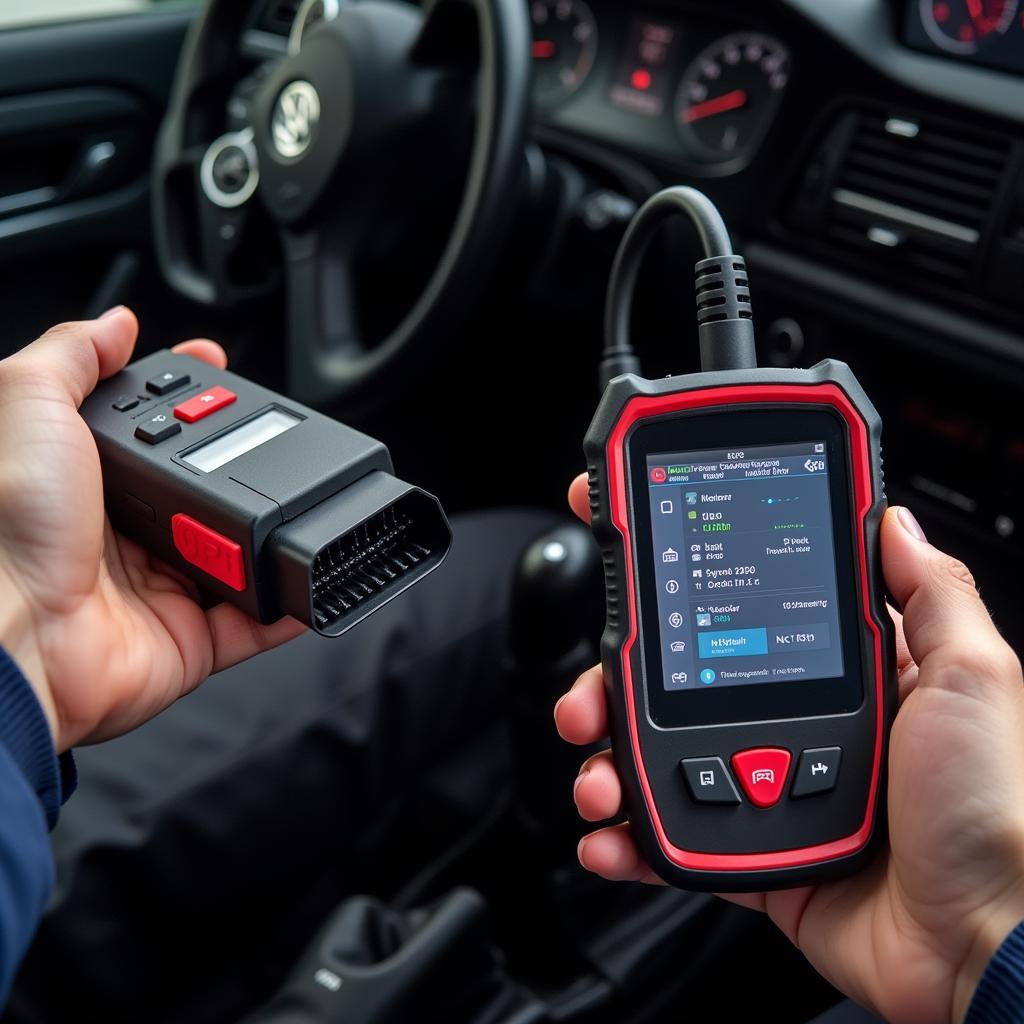In the realm of automotive technology, a car diagnose tester, specifically a diagnostic scanner, has become an indispensable tool for both seasoned mechanics and VW enthusiasts. This sophisticated equipment allows you to delve into your vehicle’s onboard computer system, unlocking a wealth of information about its health and performance. Whether you’re troubleshooting a pesky check engine light or seeking to fine-tune your VW’s performance, understanding how to effectively utilize a diagnostic scanner can be incredibly empowering.
Why is a Car Diagnose Tester Essential for Your VW?
Modern vehicles, including your beloved Volkswagen, are equipped with intricate electronic control units (ECUs). These ECUs constantly monitor various systems, from engine performance and emissions to airbag deployment and braking. A car diagnose tester, specifically designed for VW models, acts as a bridge between you and these ECUs. By plugging into the OBD-II port, usually located under the dashboard, you gain access to a treasure trove of data.
 VW Diagnostic Scanner in Action
VW Diagnostic Scanner in Action
Choosing the Right Diagnostic Scanner for Your VW
The market offers a wide array of car diagnose testers, each catering to different needs and budgets. When selecting a diagnostic scanner specifically for your Volkswagen, consider these key factors:
- VW Compatibility: Ensure the scanner explicitly states compatibility with Volkswagen models, including the specific year and model of your vehicle.
- Code Reading and Clearing: A fundamental feature of any diagnostic scanner is the ability to read and clear diagnostic trouble codes (DTCs). These codes provide insights into the specific areas where your VW might be experiencing issues.
- Live Data Streaming: For more in-depth analysis, opt for a scanner that offers live data streaming. This feature allows you to monitor real-time sensor readings, such as engine RPM, coolant temperature, and oxygen sensor voltage.
- Advanced Functions: Depending on your technical expertise and desired level of detail, you might consider scanners with advanced features like actuation tests, adaptation resets, and coding capabilities.
Understanding Diagnostic Trouble Codes (DTCs)
Diagnostic trouble codes are the language your VW uses to communicate problems. These codes, typically consisting of a letter followed by four digits (e.g., P0301), indicate specific areas or components that require attention. While a car diagnose tester will retrieve these codes, understanding their meaning is crucial.
- Type of Code: The first letter of a DTC signifies the system involved. For instance, “P” denotes powertrain-related codes, while “B” refers to body systems.
- Generic vs. Manufacturer-Specific: Some codes are generic, applying to a wide range of vehicles, while others are manufacturer-specific, unique to Volkswagen.
Common VW Diagnostic Trouble Codes
While every VW model might have its quirks, certain DTCs tend to appear more frequently:
- P0420: Catalyst System Efficiency Below Threshold (Bank 1) – Often indicates a failing catalytic converter.
- P0171: System Too Lean (Bank 1) – Could point to a vacuum leak, faulty mass airflow sensor, or issues with fuel delivery.
- P0300: Random/Multiple Cylinder Misfire Detected – Spark plugs, ignition coils, fuel injectors, or even a faulty engine control unit could be the culprit.
Beyond Code Reading: Maximizing Your Car Diagnose Tester
A car diagnose tester, especially a high-quality diagnostic scanner, offers far more than just DTC retrieval. Here’s how you can leverage its full potential:
- Live Data Analysis: Monitor sensor readings in real-time to diagnose intermittent problems or gain insights into your VW’s performance.
- Component Testing: Perform actuation tests on components like solenoids, relays, and actuators to verify their functionality.
- Adaptation Resets: After replacing certain components, use your scanner to reset adaptations, ensuring the ECU learns the new part’s parameters.
Empowering Yourself with Knowledge and the Right Tools
A car diagnose tester, particularly a specialized VW diagnostic scanner, can be a game-changer for VW owners. It empowers you with the knowledge to understand your vehicle’s health, troubleshoot problems effectively, and potentially save on costly repairs.
Remember, while a diagnostic scanner is a powerful tool, it’s essential to combine its use with research, a reliable repair manual, and, if needed, the guidance of a qualified mechanic.
Expert Insight from Michael Schmidt, ASE Certified Master Technician:
“In my 20 years of working on Volkswagens, a good diagnostic scanner has become my most trusted companion. It’s not just about reading codes; it’s about understanding the story those codes tell and using that knowledge to pinpoint the root cause of an issue.”
Frequently Asked Questions About Car Diagnose Testers for VW
1. Can I use any OBD-II scanner on my Volkswagen?
While any generic OBD-II scanner can read and clear basic engine codes, you’ll need a scanner specifically designed for VW to access manufacturer-specific codes and advanced functions.
2. How often should I use a car diagnose tester on my VW?
It’s good practice to scan your VW for codes periodically, especially if you notice any unusual behavior or warning lights.
3. Can a diagnostic scanner fix problems with my VW?
A scanner primarily diagnoses problems. It doesn’t fix them directly. However, accurate diagnosis can guide you to the necessary repairs.
4. What are some common signs that my VW needs a diagnostic scan?
Illuminated warning lights (check engine, ABS, airbag), poor fuel economy, rough idling, and unusual noises can indicate potential issues requiring a diagnostic scan.
5. Where can I find reliable information about VW diagnostic trouble codes?
Reputable online forums, Volkswagen repair manuals, and resources like DiagFixPro provide valuable insights into DTC meanings and troubleshooting tips.
Need Further Assistance?
If you require expert help with your VW’s diagnostics, feel free to reach out to our team. We’re available 24/7 via WhatsApp at +1(641)206-8880 or email at [email protected]. Let us help you keep your Volkswagen running smoothly!

Leave a Reply